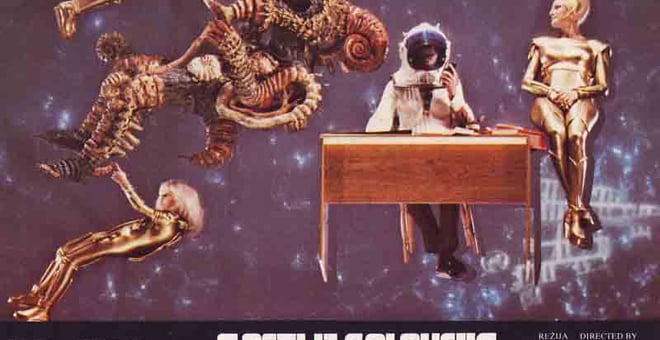Gosti iz galaksije / Visitors from Galaxy
Dušan Vukotić
Yugoslavia, Czechoslovakia / 1981 / 82' 0''Screenings
Synopsis
Robert (Žarko Potočnjak) is a science fiction novelist who discovers he can materialise his own thoughts. Everyone thinks he is crazy, but when he tells his psychiatrist that, when he was a baby, his father grew breasts in order to feed him, the doctor realises that Robert suffers from a rare disease called telurgy– the ability to materialise objects and creatures by sheer force of will. His girlfriend Biba (Lucie Zulova) is losing patience for Robert’s writing and illusions, but believes him when she sees three aliens: Andro (Ksenija Prohaska) and two children. These creatures decided to pay a visit to Earth, hoping to meet their maker – Robert. However, their stay will cause a series of unpleasant and even frightening situations...
Visitors from the Galaxy (1981) is a mixture of science fiction, comedy, horror, parody, melodrama and family film. Today’s cultists consider it a combination of trashand camp. It won a host of awards: at the fantasy festival Fantasporto in Porto (1984), the International Fantasy Award for best script in Trieste 1981, first special jury prize, Imagfic (Madrid, 1982), Grand Prix, Audience Grand Prix, FIPRESCI award, jury award for best make-up, audience award in Cádiz 1982, and main prize for directing in Brussels in 1983. The film was directed by Dušan Vukotić, director, screenwriter, animator and cartoonist, the winner of the only Croatian Oscar for his animated film The Substitute (1961), author of feature films Seventh Continent, Operation Stadium, Visitors from the Galaxy.
It is worth mentioning that this was the film debut of one of the most popular Croatian actors of today, Rene Bitorajac.
Bileća, 7 February 1927 – Zagreb, 8 July 1998
Dušan Vukotić studied architecture in Zagreb. After the Second World War, he worked as a caricaturist for “Kerempuh” (in 1953 he published a comic book Šprio i Goljo – about prehistoric people, an outstanding prequel to the comic and animated series The Flintstones by Hanna and Barbera). He also worked for “Jež”, “Vjesnik”, “Filmska kultura” and other publications. His first contact with animated film occurred in the early 1950s at “Duga film” in Zagreb. His animated debut was How Kićo Was Born (1951, with J. Sudar), and he was the head cartoonist and animator in Fadil Hadžić’s Enchanted Castle in Dudinci (1952). His aim was to create a popular character (Kićo) and make lasting satirical animated series on current issues and, based on Disney’s anthropomorphic figuration, create local colour animated humoresque. In the next stage (1954/1955), he created a series of 13 short commercial cartoons with N. Kostelac, exploring elements of reduced, modern and concise animation.
When Zagreb Film’s Animation Studio was founded, in 1956 he made his first completely independent project Robot, opening a series of humorous and lucid parodies on the most famous cinematic genre models. These are followed by western-parodies (Cowboy Jimmy, 1957), horrors (Who’s Scared, 1958), gangster films (Machine Gun Concert, 1958), science fiction (Cow on the Moon, 1959), animated fairy tales (Magical Sounds, 1957, Abracadabra, 1958), satire (My Tail is My Ticket, 1959) and an animated version of the nostalgic world of Chekhov (The Avenger, 1958). In these works (collaborating with cartoonists A. Marks, B. Kolar and Z. Grgić, animators V. Jutriša, V. Kostanjšek, Grgić and Kolar, and stage designers Z. Bourek, Z. Lončarić, P. Štalter, I. Voljevica and K. Tomp) he laid the foundation of his exceptional animated morphology consisting of white or watercolour background with flat, dynamic, graphic character and decorative ornaments. Reduction to the basic elements of animated film (background as a true medium of reality, flat parodied characters, motion expressivity, decorative colour function and reduction of external visuals to structural synthesis) help him formulate a modern cartoon language of his own. Therefore, The Avenger and Machine Gun Concert are still considered masterpieces of Croatian film. All the mentioned works won him numerous recognitions at national and international festivals.
Awards
Vukotić’s achievements, whose external virtuosity and attraction convey the author’s ideas on essential conflicts in the contemporary world and human existence to the audience, confirmed him as a great author. Piccolo (1959, awarded in London, Belgrade, Oberhausen, for which Vukotić also designed a trailer, Cork, Karlovy Vary, Ciudad de Mexico etc), The Substitute (1961, Academy Award for best animated film, first ever non-US winner, award in Belgrade, Bergamo, Cork, San Francisco, Oberhausen etc) and The Game (1962, awarded in Belgrade, Annecy, London, Oberhausen, Mannheim, Cork, Cannes, Melbourne, Prague, Milan, San Francisco etc) are some examples. Vicko Raspor provided the shortest and most accurate definition of this stage of Vukotić’s work writing about The Substitute: “These are not gags, this is philosophy, one whole outlook of the world.” Continuing experimental intertwining of animated and feature elements, he created Stain on His Conscience (1968, awarded in Cork), Opera Cordis (1968, awarded in Belgrade, Atlanta, Mamaja etc), Ars Gratia Artis (1970, awarded in Belgrade, Atlanta, London etc), Gubecziana (1974, awarded in Belgrade), Grasshopper (1975), among others. He achieved interesting results also with feature films ranging from metaphoric fairy tale (The Seventh Continent, 1966) and reminiscence of war times (Operation Stadium, 1977), to science fiction (Visitors from the Galaxy, 1981), multiple award winners in Pula, Trieste, Tehran and elsewhere. He taught film directing at the Academy of Dramatic Art in Zagreb and later studied animation theory.
Final works
His last film was made in 1993. Welcome to Planet Earth was a display of the excellent shape he was in. Vukotić began preparations for a large Czech-Croatian feature animated co-production, but never finished it. He died of a heart attack on 8 July 1998.
Director
Dušan Vukotić
Production
Zagreb Film, Barrandov Film Studio, Jadran Film, Kinematografi
categories



